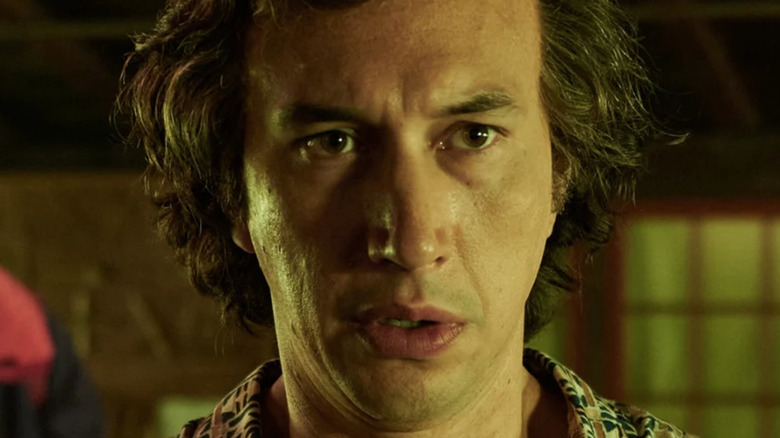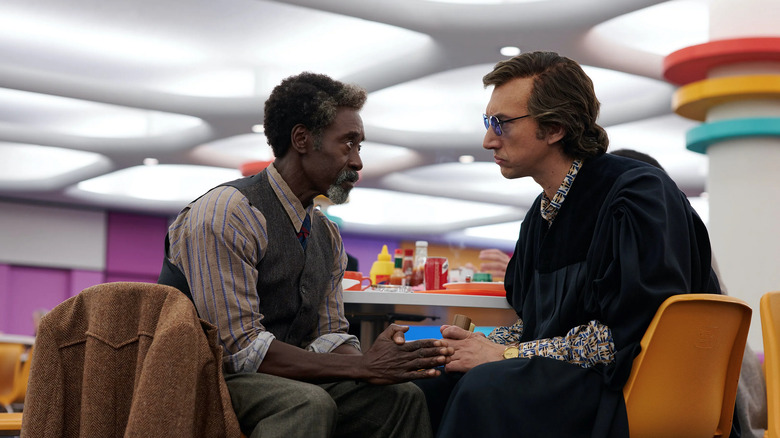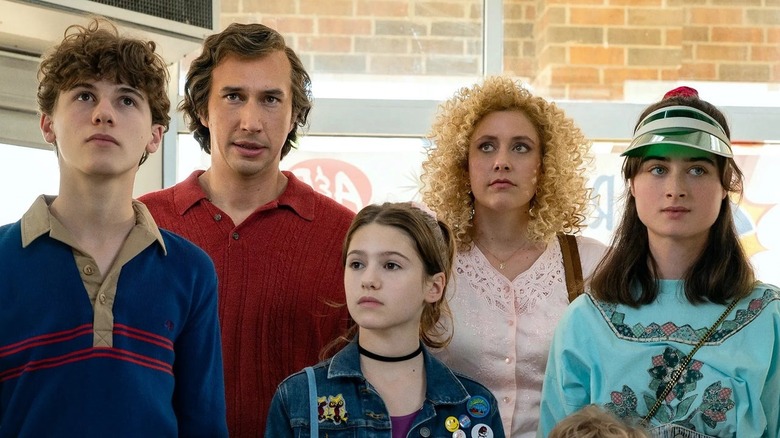White Noise Review: A Doomsday Dramedy
- Hilarious satire
- Second act's an effective disaster movie
- The year's best credits sequence
- Third act is anticlimactic
- Fails at trying to be taken seriously
"White Noise," Noah Baumbach's film adaptation of Don DeLillo's supposedly "unadaptable" 1985 novel of the same name, opens with a montage of car crashes. This is part of a class at the prestigious College-on-the-Hill taught by Professor Murray Suskind (Don Cheadle), who enthusiastically explains to his students that the car crash in American cinema is a celebratory event, one where you're just not supposed to worry about all the violence.
As this opening sequence sets up, "White Noise" fits into Baumbach's catalogue of dialogue-driven dramedies about intellectuals and academics, while dealing with subject matter he's never touched on before as a director: Hollywood's large-scale spectacle of destruction. Murray's enthusiastic celebration of the car crash plays as the ironic counterpoint to Steven Spielberg's own self-justification of spectacle in "The Fabelmans." It's also similar thematic territory to Jordan Peele's "Nope," having its Spielbergian blockbuster cake and eating it too with self-criticism.
Summing up the actual plot of this unwieldy, overlong, often very funny movie is its own difficult task, as "White Noise" changes focuses and even genres regularly, all connected by philosophical reflection on the fear of death and the things people do to try to quash that fear. Our protagonist is Professor Jack Gladney (Adam Driver), who in this heightened alternate history 1980s is a mini-celebrity for inventing the field of "Hitler Studies," all despite never having learned German. His depressed wife Babette (Greta Gerwig) has been taking mysterious pills that nobody can seem to identify. Their kids, Denise (Raffey Cassidy), Heinrich (Sam Nivola), and Steffie (Mary Nivola), are all too inquisitive for their own good. And then there's "the Airborne Toxic Event" that throws all their lives into temporary chaos.
Noah Baumbach's most ambitious film yet
Following the structure of the book, "White Noise" is divided into three sections. Part 1, "Waves and Radiation," introduces the characters and gets some huge laughs satirizing the world of academia. Jack doesn't seem like a Nazi, but he doesn't seem like a traditional serious historian of the Holocaust or World War II either; Hitler, it seems, is a subject he approaches as both a cult of personality and as a sublimation of his own anxieties. When a student asks a question about a particular assassination plot, he goes on a rant about how "all plots end in death."
Godwin's Law pops up in the silliest of contexts, with Jack being associated so heavily with his subject of study. Murray wants to start a field of "Elvis Studies" that he can claim as his own the way Jack has with the Fuhrer; "Elvis is my Hitler," he says. In one of the film's most striking scenes, Murray and Jack give competing lectures on Elvis and Hitler, with Jack essentially winning the battle by emphasizing the latter's "rock star" quality. Cheadle is absolutely hilarious as a professor for whom everything is a beautiful abstraction, while Driver is able to echo the displays of fascist power amidst personal impotency that made his performance as Kylo Ren so memorably intimidating.
Jack has convinced himself that nothing truly disastrous can happen to anyone as privileged as he and his family are, making him ill-prepared for when his kids start noticing the warning signs of a chemical waste accident. Part 2 of the film, "The Airborne Toxic Event," throws the Gladney family straight into a disaster movie, and the fears of death go from neurotic and abstract to very real. This material feels like one of the major reasons "White Noise" has been made into a movie in 2022: All the conflicting government instructions and general confusion as to just how bad this disaster can get will certainly evoke memories of the early months of 2020.
With its car chases, CGI storms, and huge crowds, presumably this middle section is where the majority of the film's budget went, which is reported to have ballooned past $100 million. The spectacle is a relatively small part of the film, but it's handled effectively. Baumbach isn't Spielberg, but he pulls off a good enough stylistic approximation to keep the action engaging while still serving the more thought-provoking satirical goals of the movie.
Not all the genre shifts work
Unfortunately, "White Noise" starts to stumble in Part 3, "Dylarama." Shifting out of the disaster movie mode back into the family drama, specifically dealing with Babette's mysterious drug usage. The anticlimactic nature of the return to a much smaller-scale storyline is clearly intentional, but it's nonetheless disappointing, especially since the consequences of Part 2's events are only barely dealt with in a purely thematic sense. Making it extra disappointing, Part 3 goes for longer stretches without much humor and subsequently becomes kind of boring.
Without the laughs, the heightened unrealistic dialogue becomes annoying rather than entertaining and it becomes hard to stay involved in the drama. Driver and Gerwig do their best to try and sell the material they're given, but when they're taking in and essentially playing abstract constructs, it's hard to get emotionally invested in Jack and Babette as characters. Having not read the book, it's easy to imagine this material better on the page than on screen.
There are occasional high points within the third act. Cassidy is very funny as the eldest daughter instigating the investigation into her mother's prescription. A genre shift into violent noir is at least somewhat interesting for doing something different. There's a scene towards the end involving a convent of German nuns that plays like gangbusters, perfectly threading the needle between comedy and philosophical tragedy. And then the final scene over the credits, a dance sequence set to the new song "new body rhumba" by LCD Soundsystem, ends the film on the highest note possible (while also making me extra curious about the dance sequences in the 2023 "Barbie" movie, which was co-written by Baumbach and directed by Gerwig).
If ambition equaled quality, "White Noise" would be one of the year's best movies. For its first two-thirds, it almost looks like that's going to be the case, only for a wildly inconsistent final act to cut off full engagement. Still, the effort is admirable, and the fact it does so much right even with all of its weaknesses makes it well worth watching for adventurous moviegoers.
"White Noise" opens in theaters on Friday, November 25, and premieres on Netflix on Friday, December 30.


